When you’re raising a baby, one thing you should always expect is to get very little sleep. But when a baby wants to nurse all night instead of sleeping through the night, it gets a bit ridiculous. You will see this nursing all night demand when your baby is near the toddler phase. Why do they do it? And what do you do to break this cycle so they don’t develop serious sleep problems.
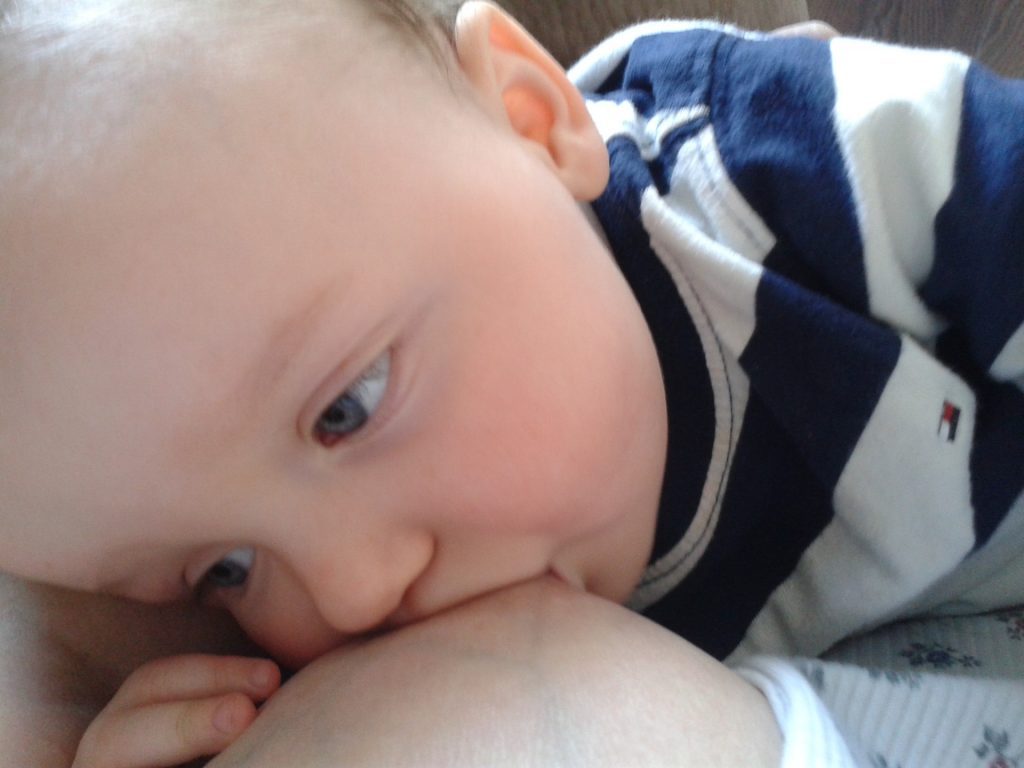
For one thing, it makes babies feel comfortable. They may also like the ambiance the night brings them. Luckily, they will grow out of this, but if you’re losing your sanity because your baby isn’t sleeping through the night, you may be able to take a few steps to make night nursing a little less frequent so you and baby can (finally) get a good night’s sleep. The baby is going to have to learn how to fall asleep independently, though, which can prove to be a problem if you are always there for them to nurse to sleep.
Reserve Feeding And Touching For Daytime
One reason your baby may be demanding you nurse them all night instead of sleeping through the night is that you don’t feed them enough during the daytime. Take a look at your feeding schedule during the daytime. Is there any room for you to daytime feed? If so, try doing that and see if the baby wants less nursing during the night and begins to sleep for longer stretches. You may just need to adjust your baby’s feeding pattern, but even something that sounds so simple to do can prove to give you a hard time.
Babies wake during the night to play. Instead of touching your baby at night, focus on bonding with your baby during the daytime. Daytime bonding will prevent them from staying awake during the night and learn to understand that night time is for resting. The baby wanting to nurse all night might be a result of how they spend the daytime. Anyone who’s had a baby knows that baby sleep can happen at all hours. However, baby sleep patterns can be molded to what you want them to be with a little effort on your part. Sleep training can help you move the baby sleep patterns around in your house to better suit the family. You can elicit the help of a trained sleep consultant for better results.
While the womanly art of breastfeeding is indeed a blessing, it can feel like a curse if your baby isn’t sleeping through the night for long periods. If needed, you can give your baby an entire nursing session right before bedtime to promote fullness and progression towards sleeping through the night. Breastfeeding at night isn’t bad for child health, but if you don’t break the cycle of it at some point, it can contribute to sleep problems for both you and your child.

Make Sure The Baby Is Deeply Asleep
Often, we will feed the baby before bed, and as soon as their eyes are closed, we believe all is said and done. However, babies will often not be in a deep sleep state yet. Put your baby in a sling, comfort them, and make sure they’re falling asleep deeply. Babies wake during the night for different reasons.
In some cases, the baby may be hungry if they haven’t gotten full from their evening nursing session. Some babies don’t sleep well if they are too hot or cold. Make sure your baby is completely comfortable. Then, lay them down gently, and maybe the baby will sleep through the night.
In some cases, it’s best for you to transition your child to fall asleep independently if your baby wants to breastfeed all night. Some people refer to this as self soothing. If your baby knows how to self soothe, he or she will be able to get themselves back to sleep when they wake up at night sometimes. It’s important for infants to learn this eventually, but for babies who are breastfeeding all night, it probably needs to happen a little bit earlier. This is something you can learn about from a sleep consultant who is helping you with your sleep training baby techniques.
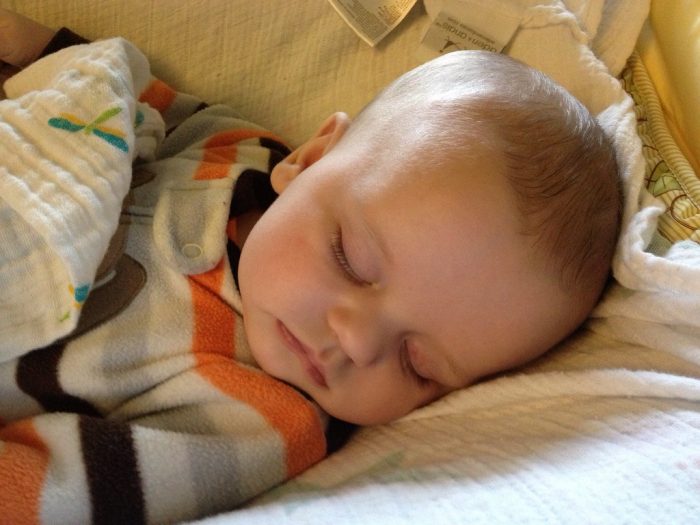
Teach Your Baby The Meaning Of No
If your baby is in the toddler stage, they may be able to understand you and should be already sleeping through the night. If you have a toddler that still isn’t sleeping through the night or they went from being a good sleeper – to waking during the night or night walking, it’s time to take action. Gently, but also assertively, telling them “no” may be the solution to your problem. You can speak to your baby in simple sentences as well and have your baby associate nighttime with the bed. You can say “mom goes beddy-bye” after giving the baby the final feeding, and tell the baby that “milk make baby sleep” or something similar. Simple, direct sentences are great for a toddler. Toddler sleep problems can be even more troublesome than baby sleep problems. And while breastfeeding toddler age children is ok, you might be making toddler sleep problems even worse if you’re nursing all night to get your child back to sleep.
Now, during the early weeks of this transition, your baby won’t be able to understand these words immediately. It may take a few weeks to progress in their natural growth, development, and comprehension for them to comprehend what you’re saying. In that case, just keep repeating it – especially if they start waking at night, and you’ll both be on your way to getting a good night’s sleep. Whether you have a baby or toddler in your home with sleep issues, understand that baby sleep and toddler sleep is very important so sleep training baby techniques may be needed in your household to ensure a child sleep pattern is developed at it’s best.
Let Dad Help Out
Let the father, or another parent, help out if your baby isn’t sleeping through the night. When one thinks about “nursing,” they think of breastfeeding, but nursing involves more than that. Easing the baby to sleep and performing a nighttime ritual are just a few examples of how dad can help mom and baby get a good night’s sleep. Try letting dad help out with the baby’s sleep routine by chipping in with nighttime parenting duties. Dads of breastfed babies can especially help out when babies and toddlers begin night walking. This might be the perfect solution for when the baby wants to nurse all night. Mom can get up if she will be nursing baby, but if there’s just going to be some sleep inducing techniques tried to promote baby sleep or toddler sleep then Dad can get up.
By taking night time parenting shifts, both parents can take turns sleeping through the night and making sure that the child sleeps and isn’t night walking after hours. Swapping shifts with nighttime parenting duties is always a good thing, as both parents should be bonded to their child. Too many children go without having a proper fatherly bond, which is a shame. But all families have a different parenting style.
If the father holds the baby and the baby starts crying, it’s because it’s a change, and they’re not used to it. The father should keep calm and comfort the baby. Even if the baby wants to breastfeed, that doesn’t mean a parent has to do that. Once a baby is old enough and has good baby weight gain, you can start working to mold your baby’s feeding schedule around more normal baby sleep patterns. Eventually, the baby will understand and accept the father, especially if it’s on a schedule, like a weekend or every other day. This works better if your baby is a little older. Try using words like “now daddy’s turn” to help reinforce the point.
When your child begins to show signs of sleeping through the night, this may also be a good time for you to wean your baby off breast milk. How to begin weaning from breast milk is one of the common concerns for new parents. Get a nice, organic formula that is close to the real thing and have the dad use it. Babies can start sleeping through the night when the baby slowly stops associating mommy’s breast with feeding time and instead associates food with bottles and other feeding methods. If you want your baby to breastfeed for a little longer, that’s ok, just work to instill better baby sleep patterns by not breastfeeding toddler or infant children through the night.
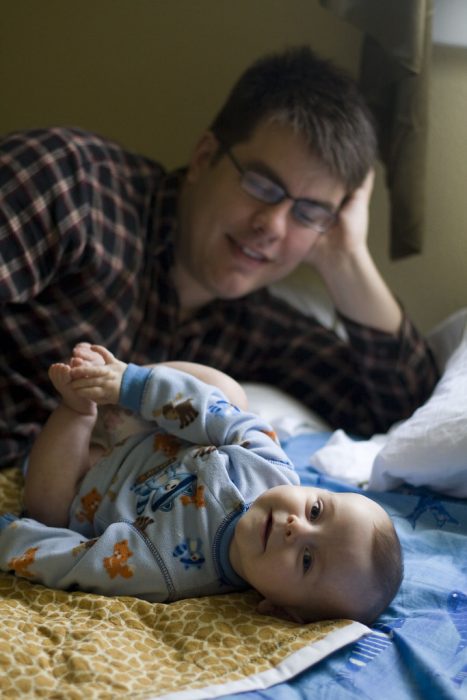
Sleep In Different Places
If you sleep in the same room as the baby, try sleeping in another place to establish the baby’s sleep habits. If you sleep near the baby, your baby thinks you’re available all night to feed them, when in reality, that’s not the case. Baby’s sleep habits can affect the baby’s physical growth, development, and cognitive functions. Disciplining them is key in putting a stop to a baby wanting to nurse all night. A sleep consultant or sleep training expert can help you with how to develop good baby sleep habits.
While sleeping in another place may seem strange at first, doing it will stop your baby from associating nighttime with feeding time. It will also improve their growth, development, and ability to self-soothe. If you don’t want to sleep in another room, you can put the baby further away, so the baby sleeping isn’t interrupted by movement or the sound of mom’s voice. This can help the baby not associate your bedroom with sleeping. Try moving around using these strategies to see if making the adjustments gets baby sleeping through the night. Perhaps you can get a better night’s sleep this way and be able to have your baby become a good sleeper as well.
It’s even more important to get your toddler sleeping in their own bed. A child sleep consultant is sure to tell you that toddlers need to be sleeping in their own space, not in your bed. Everyone has their own parenting style, which can include allowing children to sleep in the parents’ bed with them. But, toddler sleep should take place in their own beds. That’s not to say that if there are family travel plans that include an overnight stay somewhere that it’s not ok for your little one to sleep in a bed with you. It just shouldn’t be a habit at home. Baby or toddler children can be very frightened and uncomfortable by unfamiliar surroundings so you should do what you can to ensure they feel safe and secure.
Experiment And See What Happens
These tips can help, but every baby is different. Some babies started sleeping through the night immediately after coming home from the hospital. In contrast, some babies take weeks, months, or even longer to stop night walking and get a good night’s sleep. These are typical concerns that new parents have as they learn to understand normal infant sleep patterns. Depending on how long your baby has been sleeping with you, some babies will sleep all night if you simply change sleeping arrangements. Others may respond well to verbal cues. Normal infant sleep patterns can vary from baby to baby. After a few days, if you’re not noticing anything and it’s just making the problem worse, change techniques, or slow down. Sleep training should be tailored to your specific child. A good sleep consultant will know this, too.
Sometimes, the baby works better with slow, gradual change rather than something sudden. Instead of moving your baby to the other side of the bedroom, slowly move them every night, especially if they’ve been night walking to get in your bed. Giving older babies a longer distance to travel while taking the appropriate safety measures is likely to curb night walking in no time. Toddler sleep is very much interrupted by night walking so getting your child to stop doing this is important. A toddler should most certainly be sleeping through the night. If you’re still breastfeeding toddler children, you could be holding them back from normal toddler sleep patterns. To each their own with their values and parenting style, but a breastfeeding toddler isn’t really in need of what breast milk offers anyway.

Remember, It Will Pass
Sometimes, you do everything, and the baby doesn’t want to change. Unfortunately, few parents get a good sleeping schedule with a baby. In the middle of the night, they wake up and demand food or other necessities. You will get a good night’s sleep again. You just have to stick it out and work on your sleep training techniques with your sleep consultant or on your own. One day you’ll be looking back on the time when your baby or toddler wouldn’t sleep for you and you’ll exhale a big sigh of relief that it’s behind you. Remember there may be other times when baby sleep and toddler sleep patterns get interrupted from something like a growth spurt, an illness, or some other regression, but it too will pass.
Some mothers will adapt and sleep when the baby sleeps. Others may not have that luxury and carry on. Remember, sleep deprivation won’t kill you, and as long as you try to make that sleep back when your baby is old enough, you should be fine.
And remember, while you may think that you just want your baby to grow up, when they grow up, you’ll wish they were a baby again. So enjoy it while you can and adapt to your baby sleep pattern, if necessary.
Is It OK For Baby To Nurse All Night?
Night nursing is something that some mothers decide to do to help their baby sleep since it comforts some babies. Some people say it is an integral part of helping the baby develop, and be healthy… something a breastfeeding mother is typically concerned with right from the moment of pregnancy birth.
Of course, with older babies and toddlers, some moms decide against night feedings since they’re looking into night weaning, hoping to help their baby sleep through the night. Whatever you decide for your little one, it’s important to know that there are pros and cons to many decisions you’ll have to make as it relates to baby nursing. You’ll find that family travel is easier with a nursing baby since you don’t have to carry food or formula, but at the same time, you often have to stop your travels to feed your child. Hence, pro and con.

How Do I Get My Baby To Stop Nursing At Night?
Getting a baby to start sleeping from evening to morning while night weaning is vital for many moms, and that’s understandable. A few suggestions that others have tried are:
- Make sure the baby’s health is #1 priority.
- Keep frequent nursing habits that the baby has during the day steady; some moms even give their baby human milk. A health nurse can help you with how to arrange this.
- Give the baby plenty of milk or solid foods before going to bed to help them sleep through the night. This is especially important when your baby hits a growth spurt.
- Try to reduce and eventually get rid of nighttime feedings. Try to let your baby sleep through the night, even if that means they have to cry some. Also, let your toddler sleep through the night.
- If you have help with nighttime parenting, get your partner or someone else in the home to take care of the baby if/when they wake up at night.
- Bring on a sleep consultant to help you set up a good baby sleep schedule or toddler sleep schedule.
These are just a few of the steps that parents make when trying to succeed with nighttime weaning, even if there are a few small bumps and sleep problems with the baby along the way. Just like many milestones with babies, whether it’s walking or toilet training, there are going to be challenges along the way with baby sleep and toddler sleep patterns. At the end of the day, this is just a period that will pass. It’s common for breastfeeding babies to go through these things, as well as their parents.
How Do I Stop My 1-Year-Old From Nursing At Night?
Having a one-year-old baby wake up at night to nurse can be challenging for tired moms, and in some cases, an entire household. That said, to establish a better baby sleep pattern, a mother will have to work with and train their baby to develop sleep habits needed to have the little one sleep for a more extended period.
There are a few things that a mother might consider doing to help their infant sleep longer, and in some cases, sleep through the night entirely. Some of the most common are:
- Give the little one solid foods before bed; if they’re old enough.
- Get familiar with their sleep patterns, to measure when the baby wants to nurse more at night, and research ways for longer stretches of the little one staying asleep.
- Understand that even weaned babies might occasionally wake at night, especially when there are family travel plans or company at the house.
- Keep in mind that infant sleep cycles often change from one month to the next.
- Some babies just won’t sleep through the night, but they can develop pretty predictable sleep patterns and sleep habits.
- There is nothing “wrong” with deciding to nurse at night if it’s in the best interest of your baby as well as your sleep situation and needs.
- Check for physical issues like diaper rash that may be keeping your little one awake. Also, if your child has any issues from pregnancy, birth, or beyond, understand that many things can cause sleep issues.
Whatever you decide to do, do not overlook the baby’s health as it relates to healthy sleep patterns. Breastfeeding babies are known to require moms to do this kind of nighttime parenting, even though they might also have to juggle being busy during the day. The cycle continues after your child is born. Pregnancy, birth, and then breastfeeding.

How Do I Know If My Baby Is Comfort Nursing?
Comfort nursing is pretty common for many breastfed babies. It can often calm the little one, which in turn will increase the likelihood that the child sleeps through the night. If this is something that you’re struggling with as a parent, please know that other moms understand, but it is just a period since they know their little ones grew up and started sleeping all night. But hopefully, the below can help you.
To know if this is the case with your baby, it’s going to require that you add yet another thing to your nighttime parenting todo list. Simply put, you’ll need to keep track of how much food your baby is consuming and how much they need to grow, thrive, and be healthy. Once you have that information and confirm that your baby isn’t just going through a growth spurt… it will be easy to know whether or not they’re starving or just night nursing.
Baby Wanting To Nurse All Night FAQs
- When should I drop night feeds?
Experts recommend that new parents stop night feedings between 6 to 9 months around the time that the baby has been introduced to solid foods.
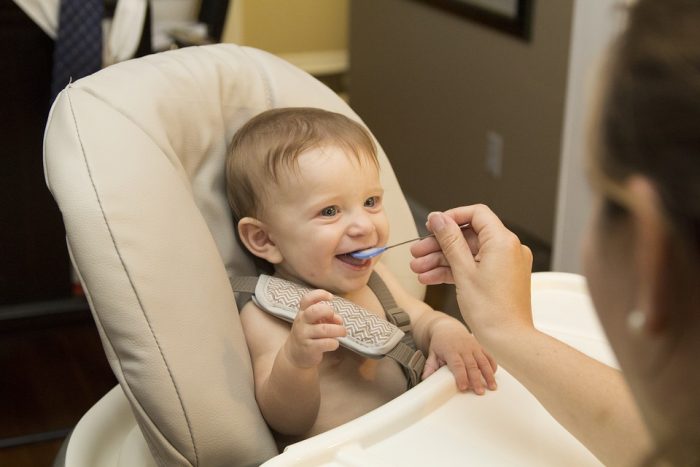
- Can I give my baby water at night instead of milk?
Yes, you can. Feeding baby water at night instead of milk can be used to begin to wean a baby from night feeding. This is really good for when you’re on family travel trips, also.
- When can a baby sleep through the night without feeding?
A baby can sleep through the night without feeding beginning around 6-9 months of age. Occasionally, you’ll get lucky and get a baby that sleeps through the night right after pregnancy birth.
- Do breastfed babies sleep through the night?
Some breastfed babies sleep through the night while others wake more frequently to nurse for more extended periods.
- How can I get my 6-month-old to sleep through the night?
There are a few steps to take to encourage your baby to sleep through the night. Start by swapping formula or milk bottles for water. Practice putting your baby to bed earlier. Create a consistent bedtime routine to encourage your baby to fall asleep on their own.
- How do I teach my baby to self soothe?
Start by weaning baby off night-time feedings to encourage self-soothing. Some babies have to be taught to self-soothe while other babies are natural self-soothers.
- At night, how can my baby sleep longer?
Encourage your baby to sleep longer at night by developing a consistent routine starting as early after pregnancy birth as possible. Wean baby off night feeds and puts the baby to bed in a cool, dark environment.
- How do I get my baby to stay asleep?
Make sure the baby has been fed, bathed, and changed before bedtime. Encourage self-soothing and monitor nap periods during the day to make sure the baby is ready for a full night to sleep at bedtime.
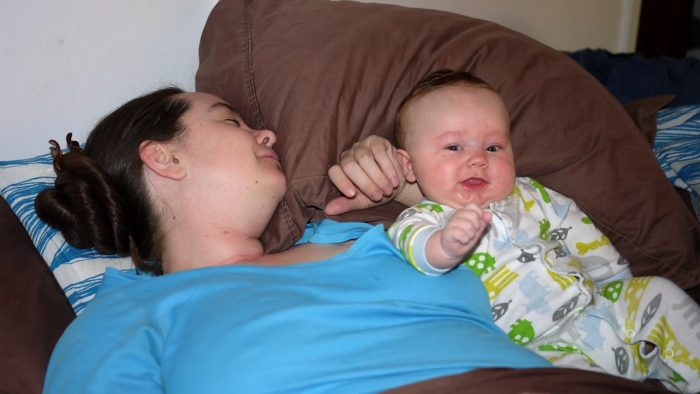
- Why does my baby keep waking up?
It’s might due to one of the following reasons.
- Teething is a common reason for babies to wake once they’ve begun to sleep through the night.
- Your baby hasn’t learned to self-soothe.
- Your baby is hungry.
- Your baby may be too hot or cold.
Is it OK for baby to nurse all night?
Normally, the baby will wake up at night, wanting to feed, especially during the younger years. Babies associate the breast with the feeling of comfort, thus relaxing them to sleep.
Why does my baby nurse all night?
Night feeds help sustain the baby’s needs. There are several reasons why babies begin to nurse all night, and the reasons are they could be hungry, babies could be teething, or they just need extra comfort.
How do I stop my baby from Comfort nursing?
Schedule feeding away from sleeping time. Do not allow the baby to sleep while sucking your breasts, gently help them release it, so they don’t sleep with it. Asleep training routine will also help them get to sleep without needing comfort nursing.
Does comfort nursing help milk supply?
Yes, it does help in milk production. Every release of milk from the breast induces an increase in production.
How do I know if my baby is comfort nursing?
When the baby is not breastfeeding effectively, especially when the feeding happens often, they might be comfort nursing. To assess, the baby is not gaining weight despite the frequency.
Is side-lying breastfeeding safe?
Yes, it is safe and useful for different situations. Side-lying breastfeeding is handy when in the hospital, when you can’t sit up after a cesarean section, or when uncomfortable sitting.
How do I teach my baby to self soothe?
There are a lot of ways to teach your baby to sleep on their own. Start with creating a routine then establishing a schedule. It will also be helpful to have a security object and create a sleep conducive environment that is quiet and dark.
Is Dream feed a full feed?
A dream feed is done so the baby will not wake up at night hungry. It is not a full feed but enough to sustain them until it’s time to wake up.
When can you stop burping a baby?
There’s no exact time you can stop burping a baby. The need will gradually decrease as they begin to take solid food when they are 4-6 months.
Baby Wanting To Nurse All Night Other Resources
https://www.babysleepsite.com/breastfeeding/reverse-cycling-baby-sleep/
https://kellymom.com/bf/normal/comfortnursing/
https://www.todaysparent.com/baby/breastfeeding/how-to-survive-your-newborns-cluster-feeding/
Last Updated on January 31, 2023 by Rejie Salazar
DISCLAIMER (IMPORTANT): This information (including all text, images, audio, or other formats on FamilyHype.com) is not intended to be a substitute for informed professional advice, diagnosis, endorsement or treatment. You should not take any action or avoid taking action without consulting a qualified professional. Always seek the advice of your physician or other qualified health provider with any questions about medical conditions. Do not disregard professional medical advice or delay seeking advice or treatment because of something you have read here a FamilyHype.com.